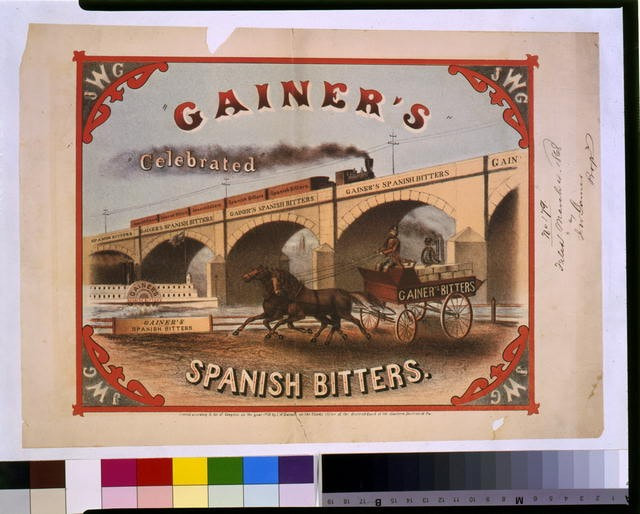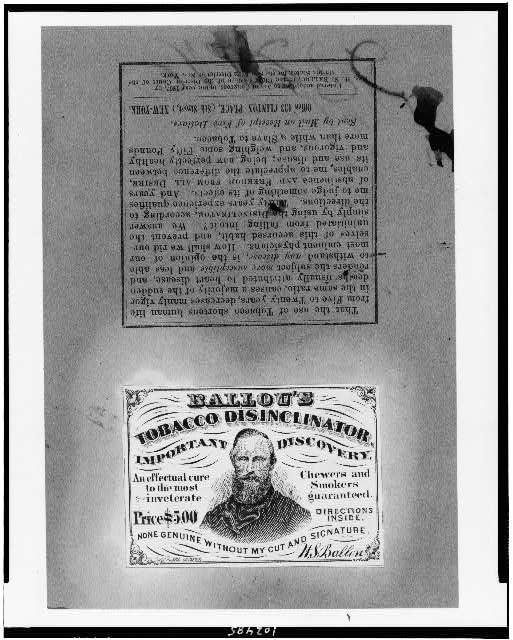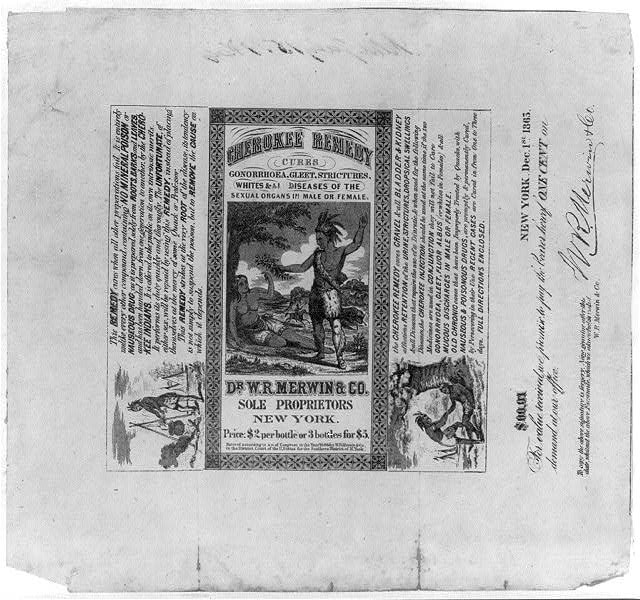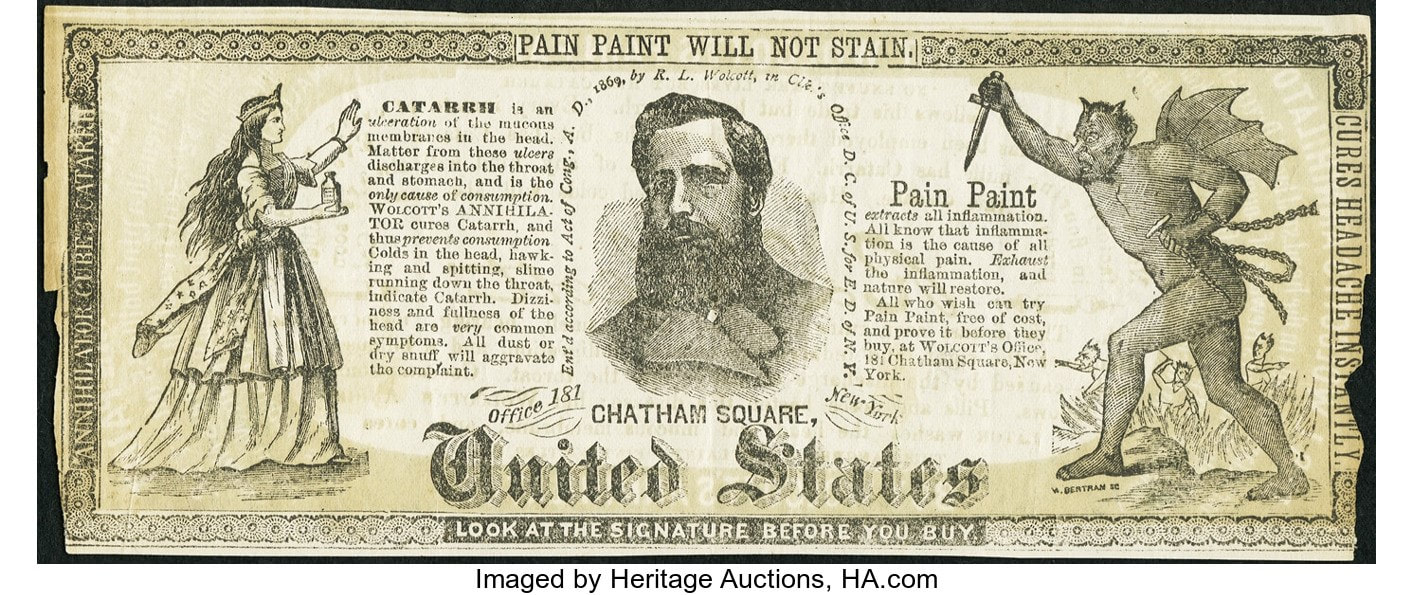|
This week I thought I’d take a different approach and talk about Patent Medicines found in the American West between 1860 and 1899. Why? Because it’s the little things that add infinite richness to our stories of the time-period. It doesn’t matter if you are writing a traditional Western, a cross-genre, Steampunk, or a Victorian Romance or Mystery, a light touch of popular patent medicine can add depth and believability while educating and entertaining your reader. Let’s begin with one of the most universal patent medicine cures of the day—Bitters. It was believed that bitters were a cure for virtually all ailments of the digestive tract. Bitters are made by infusing certain herbs, possibly Gum Arabic and lavender, in alcohol. When the infusion has reached the proper potency, distilled water is added to bring it to the proper alcohol content. No doubt, the 47% alcohol content of this product contributed to the popularity of this cure especially among the ladies, since alcohol consumption was largely confined to men at the time. Apparently, tobacco addiction was considered a problem by some folks even then. I have no idea what was included in this next patent medicine cure, but my guess would be that it included alcohol, laudanum, opioids or a combination thereof. This next one is a little more personal and frightening. Doctor W.R. Merwin’s Cherokee Remedy was sold as a cure for “gonorrhea…and other diseases of the sexual organs in male or female.” Again, no idea what was in it except that, during this period, arsenic was widely used to “cure” sexual disorders. It would be appropriate to note here that a shortage of women in many of the western towns and widespread prostitution, virtually guaranteed that western men would either abstain or contract some form of venereal disease. My final example of patent medicines of the time is notable for the totally false claims it makes for it’s curative powers and even the diagnostic claims. This advertisement for Wolcott’s Annihilator states, “Catarrh is an ulceration of the mucous membranes in the head. Matter from those ulcers discharges into the throat and stomach, and is the only cause of consumption. (Consumption was the common term for tuberculosis which we now know is caused by bacteria that spread from person to person through microscopic droplets released into the air.) The ad goes on to list another half-dozen symptoms which could just as easily be caused by influenza or the common cold and assures by implication that they are sure indicators of consumption requiring Dr Wolcott’s cure.
Again, I have no idea of the contents, but stopping the coughing of consumption of patients would have been the most certain method to convince buyers of the benefits of the product. This could be accomplished with laudanum, opiates, eucalyptus oil or certain other drugs. I would suspect the first two which were quite commonly available at the time. There were literally hundreds of patent medicines available during the period and any could add a touch of realism and depth to your story. Perhaps you’ll give it a try. Personally, I think I’ll write a short story about spending the winter in a Wyoming line-shack with a hypochondriac cow puncher. Until next time.
0 Comments
‘Tis the Season for giving. As writers, all of us have gone or are presently going through the process of learning our craft. We can all remember our first painfully awkward steps on our path to publication. Along the way we have been the recipients of some great advice, encouragement and help with the process. Maybe we had a teacher who inspired us or encouraged our early attempts. For some, it came from our peers, other writers and editors who cheered our successes and gently pushed us back on track when we strayed.
By the time we published our first story, article, or novel, we have, hopefully, benefitted from a host of beta readers, editors and proofreaders whose contributions have enriched our works beyond measure. Most of us have taken the time to share with them our heartfelt thanks for that assistance. But now, as the season approaches, let us think not about our gratitude but about how we can give back. What can we do to lend a hand to other upcoming writers and “pay it forward.” There’s a lot that we can do. First, if you haven’t been a beta reader recently, consider offering someone you don’t know a read. Reach out and give them the benefit of whatever experience you might have. You don’t have to be a published writer to offer to read someone’s work and give them notes on what you liked or didn’t like, what drew you in or left you flat. After all, you’re a reader and readers will ultimately determine the success of their work. Most professional editors would find it difficult or impossible to “donate” a novel edit, but there are dozens of writers struggling to learn the craft and get their work ready for market while juggling kids, a low-paying job, etc. Anyone who really wants to can find the time to work in an extra short story edit. Yes, that might be considered taking money out of your pocket, but I’ll bet that somewhere back down the line, an editor or exceptionally talented beta reader took the time to give you that extra bit of help. Maybe you are a seasoned writer but pressed for time. Beta reading and editing can be quite time consuming. How about offering to proofread an edited manuscript or read and give an honest review of an advance copy. For myself, I have volunteered to edit both short stories and novels outside of my paying clientele, and will continue to do so as I can. I have found that the rewards of doing a portion of my work as a volunteer, far outweigh any financial disadvantage which might accrue. So, especially in this holiday season, consider giving a gift of your talent and experience. I’ve been noticing some confusion in some of the works that cross my desk. So, let me give a few tips that may help you short story writers out there and especially those of you who write Flash Fiction. First of all, a scene is simply a setting where some action, usually involving one or more characters, takes place. On the other hand, a short story, no matter how short, is not the same as a scene. Every short story must have a beginning, a middle and an ending. Sounds simple, but it really isn’t. Let’s take them one at a time. Your beginning, also known as “The Hook” needs to do three things. First, it must introduce one or more of your main characters. You don’t necessarily have to name them at this point, but it is usually easier and more engaging than using a pronoun such as he, she or I. Second, it must establish or at least hint at some form of tension or conflict. In a novel, there may be multiple layers of conflict and tension and you might want to start with a minor one and introduce the major conflict of your story later. That’s fine in novels, but in shorter works, especially flash fiction, you usually won’t have the luxury of space to do this. The third thing your hook should accomplish is to set the scene. You need to give the reader at least some idea of the world your story takes place in. Here is a fine example of how all of this can be done in a very few words: “Every summer Lin Kong returned to Goose Village to divorce his wife, Shuyu.” From “Waiting” by Ha Jin, 1999. In these thirteen simple words, Ha Jin has accomplished all that is required of a hook. We know who two of the main characters are, where the story takes place, and presumably, we’re dying to find out why he keeps divorcing his wife (tension). Perfect. The second element of your story is the middle or body of the work. This is where the action takes place in one or more scenes to move the characters from your hook to your ending. For writing in general, more so for Short Stories and most especially in Flash Fiction, every word must either move the story forward or illuminate and develop the character. Here is a good example of how a simple line can illuminate a character. “In spite of everything, I still believe people are really good at heart.” From “Diary of Anne Frank” by Anne Frank. Here’s another that both moves the story forward and illuminates the character. “As he read, I fell in love the way you fall asleep: slowly, and then all at once.” From John Green, “The Fault In Our Stars”. Of course, not every line we write will be as great as these, but they should be both a template and an aspiration. The final element of your story, appropriately, is the ending or denouement. This is where your main character achieves his or her goal, or alternatively, fails utterly. This is where you draw any loose threads of the story together to give the reader a satisfactory conclusion. Here, too, is where your main character realizes how he/she has changed over the course of the story. So, a story is much more than a scene although scenes are necessary to building your story. Until next time, write happily and write well. |




 RSS Feed
RSS Feed